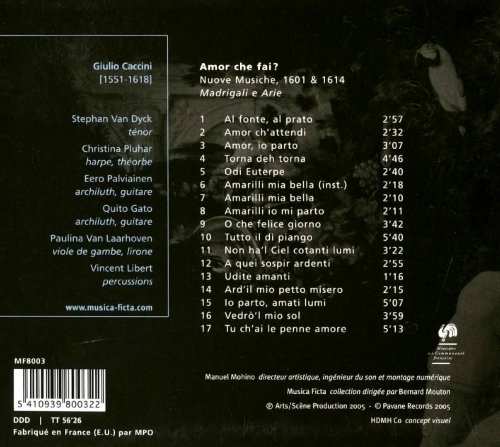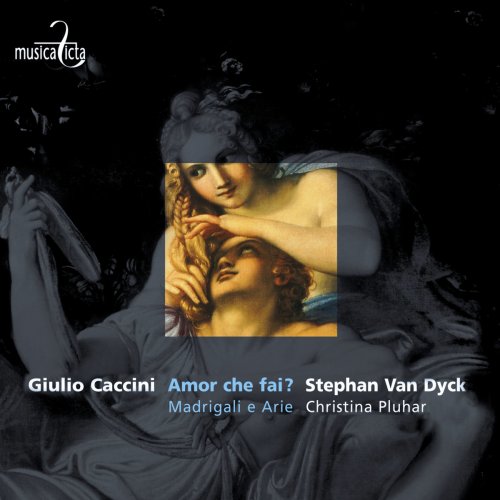
Stephan Van Dyck - Caccini: Amor che fai? - Madrigali e arie (2005)
BAND/ARTIST: Stephan Van Dyck, Christina Pluhar
- Title: Caccini: Amor che fai? - Madrigali e arie
- Year Of Release: 2005
- Label: Musica Ficta
- Genre: Classical
- Quality: FLAC (tracks+booklet)
- Total Time: 56:16 min
- Total Size: 236 MB
- WebSite: Album Preview

Tracklist:
01. Al fonte, al prato
02. Amor ch'attendi
03. Amor, io parto
04. Torna deh torna
05. Odi Euterpe
06. Amarilli mia bella (Instrumental)
07. Amarilli mia bella
08. Amarilli io mi parto
09. O che felice giorno
10. Tutto il dì piango
11. Non ha'l Ciel cotanti lumi
12. A quei sospir ardenti
13. Udite amanti
14. Ard'il mio petto misero
15. Io parto, amati lumi
16. Vedrò'l moi sol
17. Tu ch'ai le penne amore
If Claudio Monteverdi was the "father of the Baroque," then Giulio Caccini was its great uncle. Monteverdi aside, one could argue that Caccini was the truer parent to the style, as his extant output is almost exclusively for solo voice with continuo accompaniment, the benchmark genre of early Baroque style. Caccini only narrowly missed being the first composer to write an opera -- owing to a fit of extreme professional jealousy, Caccini came in second, and shortly afterward, became the first to publish an opera. These distinctions have not earned Caccini the blessings that Monteverdi has enjoyed in terms of recordings. While they are not as numerous, there are enough now that we have a choice between the very good, downright awful, and most things in between. MusicaFicta's Caccini: Amor che fai?, featuring tenor Stephan Van Dyck with a string continuo group led by harpist Christina Pluhar, is far from being as bad as we have seen in terms of Caccini recordings, but it falls short of the best.
Van Dyck is definitely a superior-grade singer, and some of his readings stand owing to their energy and precision of pitch, namely "Al fonte, al prato," the vocal version of "Amarilli mia bella," and "Tutto il di piano," arguably the best realization on the disc. Caccini had very specific ideas about vocal ornaments, which is one reason why many singers have been reluctant to undertake his work. The stuttering, repeated-note "passagi" are a particular case in point, and Van Dyck has developed a variety of ways to approach these ornamental figures. Crisp, staccato delivery is certainly the way to go, and lazy, unfocused execution is not. Unfortunately, while there is evidence of both of these approaches on Caccini: Amor che fai, the latter is found with more frequency. Van Dyck sings well in tune, but his tenor voice is a little dull sounding and lacks a true top -- he sounds a little like a countertenor that has smoked perhaps a few too many cigarettes and will not venture into a falsetto. At the start of the disc, Van Dyck sounds fine, but it doesn't hold up in the long haul; taking Caccini: Amor che fai? in perhaps two stages seems to work best. One thing that works is the continuo, made up of harp or theorbo, two archlutes or two Baroque guitars or a combination thereof, gamba or lira, and percussion. Pluhar's group changes these instruments up with every track and, in a couple of instances (not nearly enough), are given a spot to shine without the singer. Caccini: Amor che fai? is a mixed, and somewhat frustrating, bag, but the elements about it that are appealing redeem it, if not to elevate it to the top tier.
Van Dyck is definitely a superior-grade singer, and some of his readings stand owing to their energy and precision of pitch, namely "Al fonte, al prato," the vocal version of "Amarilli mia bella," and "Tutto il di piano," arguably the best realization on the disc. Caccini had very specific ideas about vocal ornaments, which is one reason why many singers have been reluctant to undertake his work. The stuttering, repeated-note "passagi" are a particular case in point, and Van Dyck has developed a variety of ways to approach these ornamental figures. Crisp, staccato delivery is certainly the way to go, and lazy, unfocused execution is not. Unfortunately, while there is evidence of both of these approaches on Caccini: Amor che fai, the latter is found with more frequency. Van Dyck sings well in tune, but his tenor voice is a little dull sounding and lacks a true top -- he sounds a little like a countertenor that has smoked perhaps a few too many cigarettes and will not venture into a falsetto. At the start of the disc, Van Dyck sounds fine, but it doesn't hold up in the long haul; taking Caccini: Amor che fai? in perhaps two stages seems to work best. One thing that works is the continuo, made up of harp or theorbo, two archlutes or two Baroque guitars or a combination thereof, gamba or lira, and percussion. Pluhar's group changes these instruments up with every track and, in a couple of instances (not nearly enough), are given a spot to shine without the singer. Caccini: Amor che fai? is a mixed, and somewhat frustrating, bag, but the elements about it that are appealing redeem it, if not to elevate it to the top tier.
As a ISRA.CLOUD's PREMIUM member you will have the following benefits:
- Unlimited high speed downloads
- Download directly without waiting time
- Unlimited parallel downloads
- Support for download accelerators
- No advertising
- Resume broken downloads


